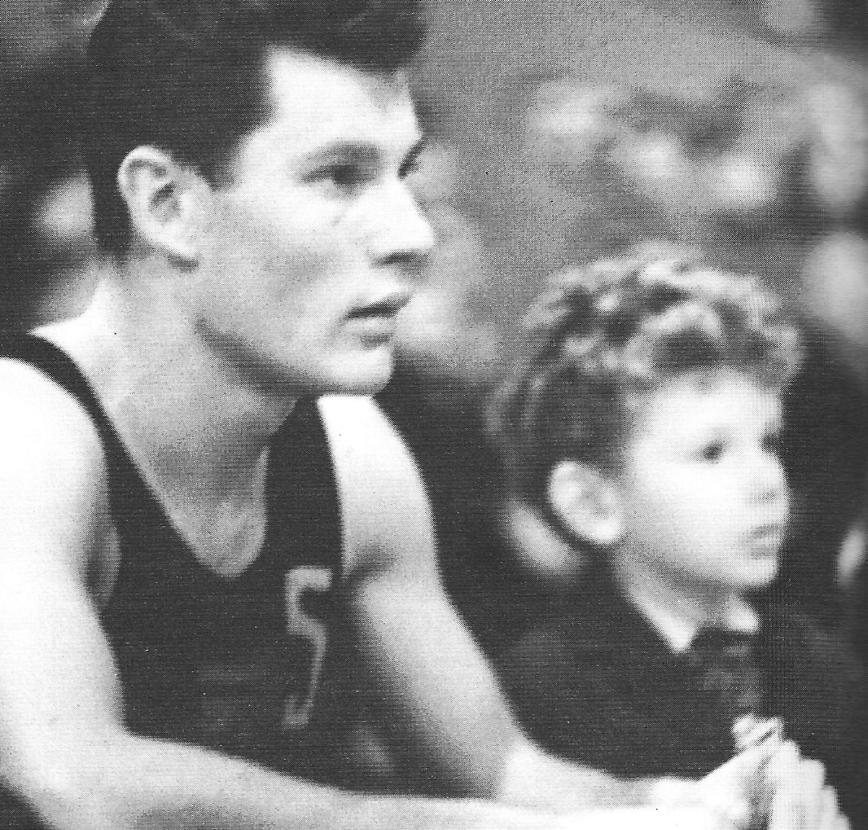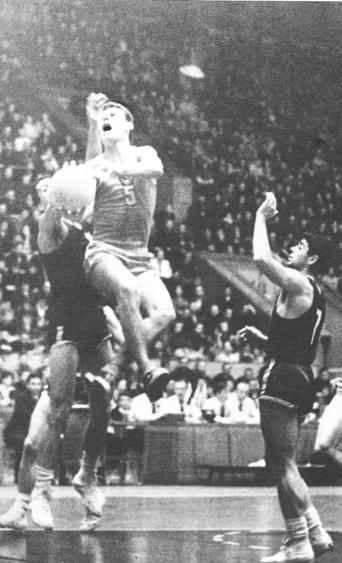
6 minute read
MODESTAS PAULAUSKAS
Modestas
Paulauskas
Advertisement
The first Lithuanian “king” I t was early April 1964. FIBA had just inaugurated its first European Championship for Junior Men in Naples, Italy. Only eight teams took part in that tourney – Spain, Yugoslavia, Czechoslova kia, Bulgaria, Italy, France, Poland and the USSR – and in the title game, the Soviet team defeated France 62-41. The first player to receive the trophy was number 10, Modestas Paulauskas, who was born in Kretinga, Lithuania on March 19, 1945. He had just scored 14 points in the final that would make the USSR the first junior champ in Europe. It was a lot less than his average of 21.2 points – against Yugoslavia, he had scored 36 and against host Italy, 26 – but enough to be chosen, unofficially, as the MVP of the tourney. Ranko Zeravica, at the helm of the Yugoslav team, said when he got back home that he had just seen “a phenomenal player.” From that USSR generation, aside from Paulauskas, there would be another player to leave a strong mark in basketball, Zurab Sakandelidze. But at the same tournament, there were other interesting players and future super stars, like Aldo Ossola and Carlo Recalcati for Italy, Jiri Zednicek of Czechoslovakia, Bogdan Tanjevic of Yugoslavia (even though he would become better known as a coach), and Vicente Ramos and Juan Martinez for Spain.
Many years later, Paulauskas revealed that it was fate that drove him to this title. The Soviet team, for
some reason, missed the flight that was to take them to the tournament. That plane crashed and left no sur vivors. The young players avoided the tragedy and also won the European Championship. Only a year later, at the 1965 EuroBasket for men, Paulauskas was already a big star. In the final, a 58-49 win over Yugoslavia, he was the top scorer of his team with 16 points. He was named MVP of the tournament with an average of 13.8 points. He was just 20 years old. He was a shooting guard by size (1.94 meters) but he was able to play point guard or, due to his great rebounding skills, small forward. It was clear that the USSR had a true star for the future.
Unforgettable Munich In the next nine years, the USSR would win three more EuroBasket golds (1967, 1969, 1971) and a bronze medal (1973) with Paulauskas, as well as the World Cup gold (1974, Puerto Rico) and bronze (1970, Ljubljana) medals, an Olympic gold (1972, Munich) and an Olympic bronze (1968, Mexico City). Paulauskas lacks titles at the club level because he spent his en tire career, from 1962 to 1976, with Zalgiris Kaunas, which was always behind CSKA Moscow and Spartak St. Petersburg in those years. However, his wish was to stay with the club he started with, and so he did. “I had offers from CSKA and Spartak, but I didn’t want to leave my club or my city,” he said many times. “It was my choice and I don’t regret it.”
If he was short on titles with Zalgiris, he had no room for more with the national team. He shined in each and every tournament that he played. In the final of the 1967 EuroBasket in Helsinki, against Czechoslovakia, an 89-77 victory, he scored 19 points, even though the MVP was Jiri Zednicek, his
101 greats of european basketball Modestas Paulauskas
peer from that first junior tournament in 1964. In the final of the 1969 EuroBasket in Naples, his favorite city, the USSR beat Yugoslavia by the score of 81-72, with 20 points from Paulauskas and also 20 by big man Vladimir Andreev, even though the MVP of the tourney was Sergei Belov, another great. After a dip at the 1970 World Cup in Ljubljana, where the USSR “only” took the bronze (11.4 points for Paulauskas), at the next EuroBasket, in Essen, Germany, the USSR beat Yugoslavia again in the final game, 69-64, with 12 points by Paulauskas and 16 by Alzhan Zhar mukhamedov. The all-tournament team was formed by Belov, Paulauskas, Edward Jurkiewicz of Poland, Kreso Cosic of Yugoslavia and Atanas Golomeev of Bulgaria.
At the Mexico City Olympics of 1968, the USSR lost to Yugoslavia in the semis and took the bronze with an average of 16 points by Paulauskas. But four years later, at the 1972 Olympics in Munich, the gold would go to the Soviets. The final against the Unit ed States will always be infamous for the last three seconds being replayed on orders by FIBA secretary general William Jones due to a mistake by the offi cial’s table. The USSR turned an apparent 50-49 loss into a 51-50 victory thanks to a basket by Alexander Belov. Paulauskas only scored 3 points that day, on 3 of 4 free throws, but he was one of the team’s best rebounders at 3.9 per game during the tournament. Even though he normally puts all his triumphs and medals at the same level, Paulauskas admits that Munich does have a privileged spot in his memories: “Because of the circumstances, its importance, the rival... basically because of everything implied by beating the United States in an Olympic final, Mu nich 1972 is something unforgettable,” Paulauskas said in an interview with a Lithuanian newspaper in 2005.
Best sportsman seven times For Lithuanian basketball connoisseurs today, the basketball stars from that country are Arvydas Sab onis, Sarunas Jasikevicius, Arturas Karnisovas, Sarunas Marculionis, Valdemaras Chomicius and Rimas Kurtinaitis. But for those with older memories, the first great Lithuanian was Modestas Paulauskas, a com plete player. For coaches, he was like life insurance, a player who never let you down. Of course, he could not always play at the highest level, but he never went down to a point that he was not recognizably himself on the court. His averages in big competitions were always similar, the minimum was 11.1 points in Munich 1972 and the maximum was 17.0 points at the 1969 EuroBasket. His average in FIBA competitions was 13.7, just like in most of the tournaments he played.
His popularity in Lithuania was huge. He was named the best sportsman in Lithuania seven times between 1965 and 1972, only missing the distinction in 1968. The first “king” of Lithuanian basketball retired at just 32 years old because he felt that “the batteries had run dry”. He stayed in basketball as a coach, but far from the spotlight. “Maybe destiny had it for me to be a player and not a coach,” Paulauskas said. “Just as it decided that we did not catch that plane in 1964.”
In 1991, FIBA chose Paulauskas among the best 50 players of all time. In that list (until 1991, of course) there are 12 names from the former Yugoslavia and 10 from the USSR: Sergei Belov, Alexander Belov, Ste pas Butautas, Otar Korkia, Sarunas Marculionis, Anatoly Myshkin, Modestas Paulauskas, Arvydas Sabonis, Alexander Volkov and Viktor Zubkov.

ily. He was once asked, if it was really a second religion in Lithuania, who was the god of basketball? His an swer: “Many, but today I would say Arvydas Sabonis. I admire his talent and I even feel a little envy.”
Paulauskas had his childhood idols in Stepas Butautas and Stasys Stonkus, the best Lithuanian players in the early 1960s. Talking about talent, Pau lauskas believes that nowadays in basketball “there is more desire than talent.” He thinks that a sportsman, to succeed, aside from talent, has to be hungry and ready to sacrifice himself.
And if anybody wants to see a very talented player, versatile, able to play as many as four positions, try to track down a video of Paulauskas in his prime. One of the greats.
As the first of the three most important things in his life, Paulauskas highlights the fact that he was raised in a sports family, with elder brothers and one of his sisters having been athletes as well. In second place, he names his club, Zalgiris, and in third, his fam










